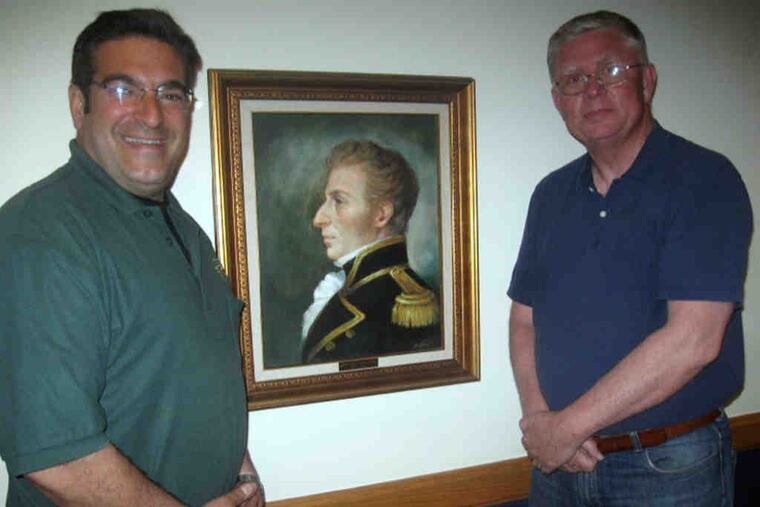N.J. family finds hope for the return of a U.S. hero buried in Libya
Eight U.S. sailors are buried beneath Green Square in Tripoli, where the followers of Libyan dictator Moammar Gadhafi often gather in support of their embattled leader.

Eight U.S. sailors are buried beneath Green Square in Tripoli, where the followers of Libyan dictator Moammar Gadhafi often gather in support of their embattled leader.
Nearby are the graves of five more, in the shade of olive trees in a tiny walled cemetery that overlooks the harbor.
More than 200 years ago, Navy Master Commandant Richard Somers and a dozen volunteer crewmen sailed an explosives-laden Intrepid toward an anchored pirate fleet in the harbor.
The ship blew up before completing its mission, killing all aboard. Somers - a former University of Pennsylvania student - and his crew were recovered and buried.
But never forgotten.
Since the 1804 deaths, generations of the Somers family have worked to have the remains of the 13 Navy members bought back to the United States.
They've been joined by state and federal legislators and officials who have tried to gain Libya's permission for the repatriation - with no luck.
Now, with Gadhafi's future in doubt, some believe changes in the country might finally bring them success.
That feeling may be strongest in Somers Point, where Somers was born. The Atlantic County town was named after the naval hero's great-grandfather and residents there hold a Richard Somers Day celebration every September.
Efforts are under way to raise funds to build a monument, where Somers can someday be laid to rest.
"If a new [Libyan] regime comes in, we'd have a better chance of success," said Dean Somers, 66, a Galloway Township resident and distant relative of Richard Somers' who has worked to bring the hero home. "I think the unrest offers some hope."
Dean Somers and other supporters were encouraged last month by the introduction of a bill in the House of Representatives calling on the defense secretary to "take whatever steps may be necessary" to return Somers and his comrades.
The effort follows two 2004 New Jersey Assembly resolutions that sought the same outcome.
"We're willing to wait," said Somers Point Mayor Jack Glasser, who joined Dean Somers and others during a recent trip to Washington to encourage congressional action. "We've waited more than 206 years. What's a couple more?
"Let's get everybody together in the U.S. government so we can go to the Libyans to negotiate to bring these heroes home."
The daring attempt by Somers and his crew - like early Navy SEALs on a secret mission - captured the imagination of Americans. Six Navy ships have been successively named the Somers.
The town of Somers in Westchester County, N.Y., also was named in the sailor's honor. And Somers' name was placed on the Tripoli Monument, a white marble statuary at the Annapolis Naval Academy.
The military memorial is one of the oldest in the United States.
"Isn't it national policy not to leave anyone behind?" asked historian and author Bill Kelly, who wrote a history of Somers Point called Three Hundred Years at the Point. "The family wants them home.
"If these guys died during Vietnam or World War II, they would be brought back," said Kelly, 59, of Browns Mills. "They're still buried behind enemy lines, still in the hands of the pirates.
"Like the old Spartan saying, 'Come home with your shield - or on it.' "
Somers attended the Philadelphia Free Academy and Penn with the future naval hero Stephen Decatur. Decatur had used a captured pirate ship - dubbed the Intrepid - in one of the first Navy special operations, to sink a U.S. ship that had been captured by pirates. The Philadelphia had run aground in Tripoli harbor and fallen into the hands of the pirates. Decatur successfully sank the captured frigate earlier in 1804.
Somers' bold mission, in the same Intrepid, ended with a tremendous explosion. Among the dead was Lt. Henry Wadsworth, the son of Revolutionary War Gen. Peleg Wadsworth and uncle of Henry Wadsworth Longfellow, author of American classics such as "Paul Revere's Ride."
"The Libyan government was open to us at one time, but the political scene has changed over there," said Glasser. "Once everything is stabilized over there, we can work on this."
In the meantime, he said, "we need our government's support."
The bill in the House requires at least 300 sponsors before it can move forward, said Michael Caputo, a member of an ad hoc committee pursuing the crew's repatriation. Caputo, a public relations executive, represented the Somers family and Somers Point during negotiations with the Gadhafi family several years ago.
"We've started an aggressive promotional program [to win over other House members] and the national American Legion voted approval of a resolution to support [the bill] and help drive cosponsors," Caputo said.
Somers would be buried in Somers Point, while Wadsworth would be reinterred in Maine and the others at Arlington National Cemetery.
"I'm not sure what the chances are of recovering the remains," said Glasser. "There are many obstacles.
"But it's time to do this. Our town has a deep maritime history and Richard Somers is a favorite son lying in foreign soil."